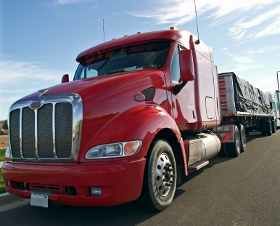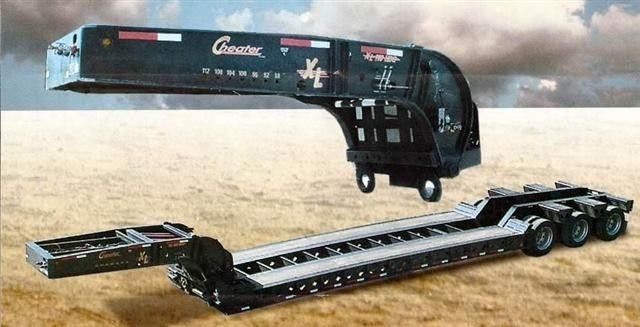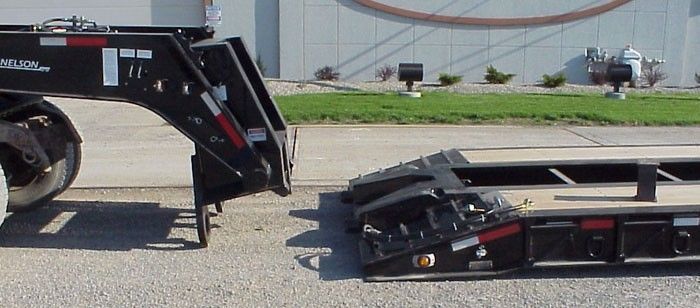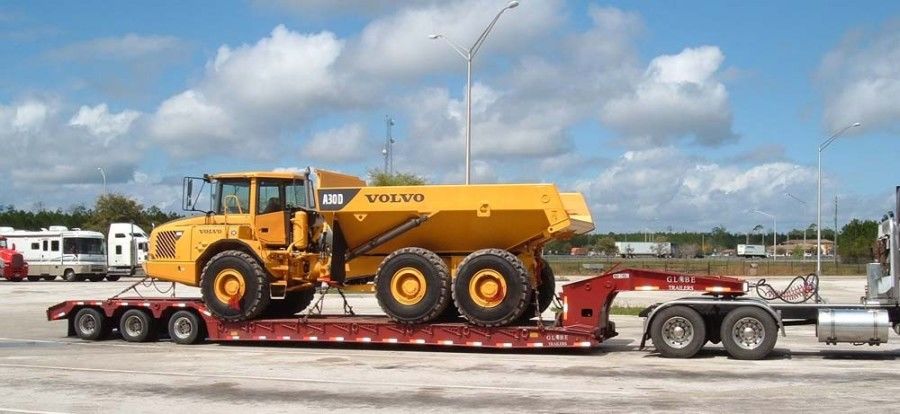O/D Pulling An RGN As A Newbie!
Topic 19645 | Page 1
Three weeks to learn to drive and to learn how to secure heavy equipment? It has been done before (Pat M. could tell us about it) but it would be a real challenge with a lot of risk.
What would you be hauling? Would it be OTR , or out and back every day?
OTR:
Over The Road
OTR driving normally means you'll be hauling freight to various customers throughout your company's hauling region. It often entails being gone from home for two to three weeks at a time.
It is OTR. Would be hauling farm equipment, construction vehicles, air condition units.
OTR:
Over The Road
OTR driving normally means you'll be hauling freight to various customers throughout your company's hauling region. It often entails being gone from home for two to three weeks at a time.
Your training will probably deal mostly with securement and 3 weeks is ok if you have a good teacher who will take the time to explain and help you learn the regs. Start now by reading about permits, state requirements etc because you and only you are responsible for knowing those state requirements. Most important, never ever be afraid to ask a question. Don't move that truck until you know it is safe and legal to do so because DOT knows lol. Nobody is going to take the heat for you if things go sideways and not paying attention can get someone killed. Don't get in a rush, double and triple check everything every time.
DOT:
Department Of Transportation
A department of the federal executive branch responsible for the national highways and for railroad and airline safety. It also manages Amtrak, the national railroad system, and the Coast Guard.
State and Federal DOT Officers are responsible for commercial vehicle enforcement. "The truck police" you could call them.
HOS:
Hours Of Service
HOS refers to the logbook hours of service regulations.OWI:
Operating While Intoxicated
It is OTR. Would be hauling farm equipment, construction vehicles, air condition units.
Sounds like a gig with R E West in Ashland City, TN. Kinda stuff they haul regularly.
OTR:
Over The Road
OTR driving normally means you'll be hauling freight to various customers throughout your company's hauling region. It often entails being gone from home for two to three weeks at a time.
Your training will probably deal mostly with securement and 3 weeks is ok if you have a good teacher who will take the time to explain and help you learn the regs. Start now by reading about permits, state requirements etc because you and only you are responsible for knowing those state requirements. Most important, never ever be afraid to ask a question. Don't move that truck until you know it is safe and legal to do so because DOT knows lol. Nobody is going to take the heat for you if things go sideways and not paying attention can get someone killed. Don't get in a rush, double and triple check everything every time.
Yes, this. Please understand I am not saying you can't do it, just that three weeks isn't much time to come across some of the loads you are bound to get at some point.
On the other hand, I had ten weeks and I still had loads after I went solo where I had to call someone for help figuring out how to secure something. I remember once I went to pick up a load after hours of two big Caterpillar engines. They were different sizes. The little one was pretty easy to figure out, but I ended up texting pictures of the big one to two different friends and then talking through it before I was comfortable driving away with that thing.
If you are at a shipper where there are other drivers, you can ask for help, and nine times out of ten you'll get more help than you wanted lol. In fact, if four drivers come over to help you, you'll learn five new ways to secure that load.
The main thing will be to bring your A game every day, and to take your time, especially with overdimensional loads. If you can learn to control the truck well in a short time, you'll be fine. Riding the white line with an overwidth load is a particular skill. Making a right turn with an overlength load is a different particular skill. Like I said, it's been done before, but starting out with that is not for the timid or the reckless.
Shipper:
The customer who is shipping the freight. This is where the driver will pick up a load and then deliver it to the receiver or consignee.
DOT:
Department Of Transportation
A department of the federal executive branch responsible for the national highways and for railroad and airline safety. It also manages Amtrak, the national railroad system, and the Coast Guard.
State and Federal DOT Officers are responsible for commercial vehicle enforcement. "The truck police" you could call them.
HOS:
Hours Of Service
HOS refers to the logbook hours of service regulations.OWI:
Operating While Intoxicated

As Bud said, I did it but was nowhere near safe in the beginning as I had no training. Be respectful but not fearful. Personally, I would not put someone new in the drivers seat. There are exceptions to every rule but for a new driver to start out in OD or heavy loads no way. Say you screw up and hit a bridge or something else, being a new driver your career is all but over. I have moved all kinds of stuff from lumber to 140 foot bridge beams. Good experience but I would not want to go that route knowing what I know now.
OWI:
Operating While Intoxicated
Thanks guys, leaning more towards a dry van or reefer. Yeah 3 weeks OTR with a trainer, not enough. O need to get experience but, somewhere else
OTR:
Over The Road
OTR driving normally means you'll be hauling freight to various customers throughout your company's hauling region. It often entails being gone from home for two to three weeks at a time.
Dry Van:
A trailer or truck that that requires no special attention, such as refrigeration, that hauls regular palletted, boxed, or floor-loaded freight. The most common type of trailer in trucking.Reefer:
A refrigerated trailer.

I understand you are talking about hauling oversized equipment of some sort, and I feel kinda dumb asking the question. But what does O/D and RGN stand for?
I understand you are talking about hauling oversized equipment of some sort, and I feel kinda dumb asking the question. But what does O/D and RGN stand for?
O/D is "over dimensional," i.e., > 13'6" high, > 8'6" wide, > 53' long, or a combination of those.
RGN is "removable gooseneck," which is a type of trailer that allows the gooseneck to be detached from the trailer, making it easier to drive heavy equipment onto the deck. The gooseneck is reattached and the truck can pull away the whole load.



HOS:
Hours Of Service
HOS refers to the logbook hours of service regulations.OOS:
When a violation by either a driver or company is confirmed, an out-of-service order removes either the driver or the vehicle from the roadway until the violation is corrected.
New Reply:
New! Check out our help videos for a better understanding of our forum features

















Preview:








 TT On Facebook
TT On Facebook
Hi, have a company that is interested in me. They have no contract in house training. Should a newbie have anything to do with pulling an RGN? The company has dry vans but, will not put one where I live. The training seems short to me only 3 weeks! But, I am a newbie, what do I know Any opinions, comments would be appreciated. Thanks
Dry Van:
A trailer or truck that that requires no special attention, such as refrigeration, that hauls regular palletted, boxed, or floor-loaded freight. The most common type of trailer in trucking.